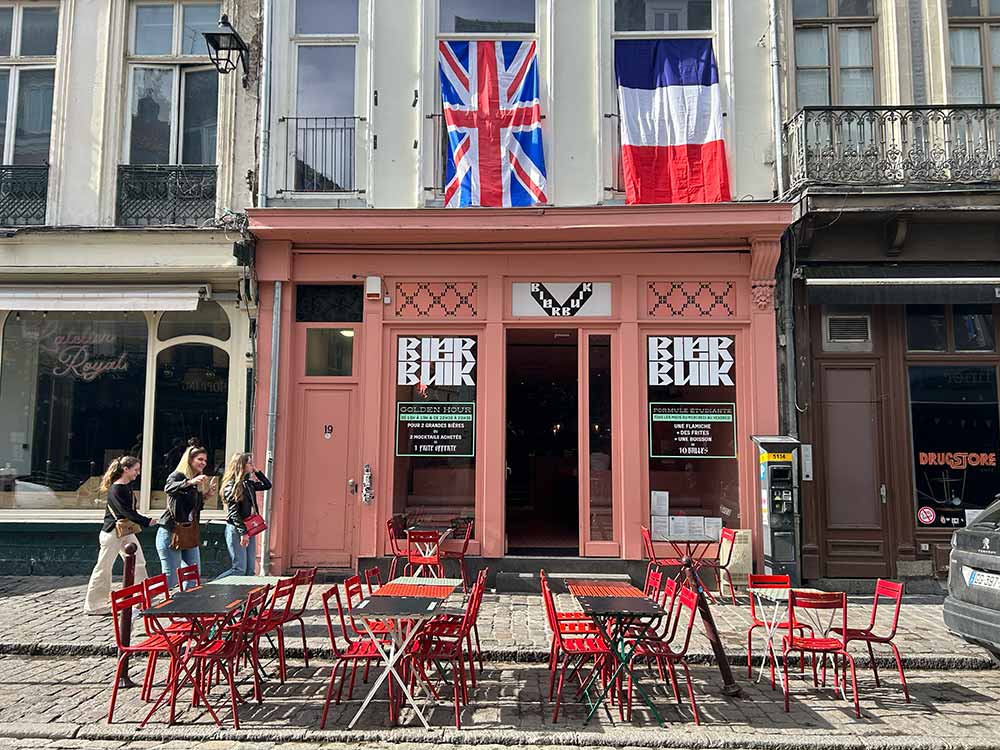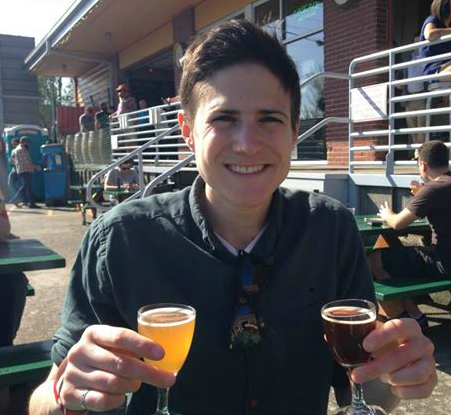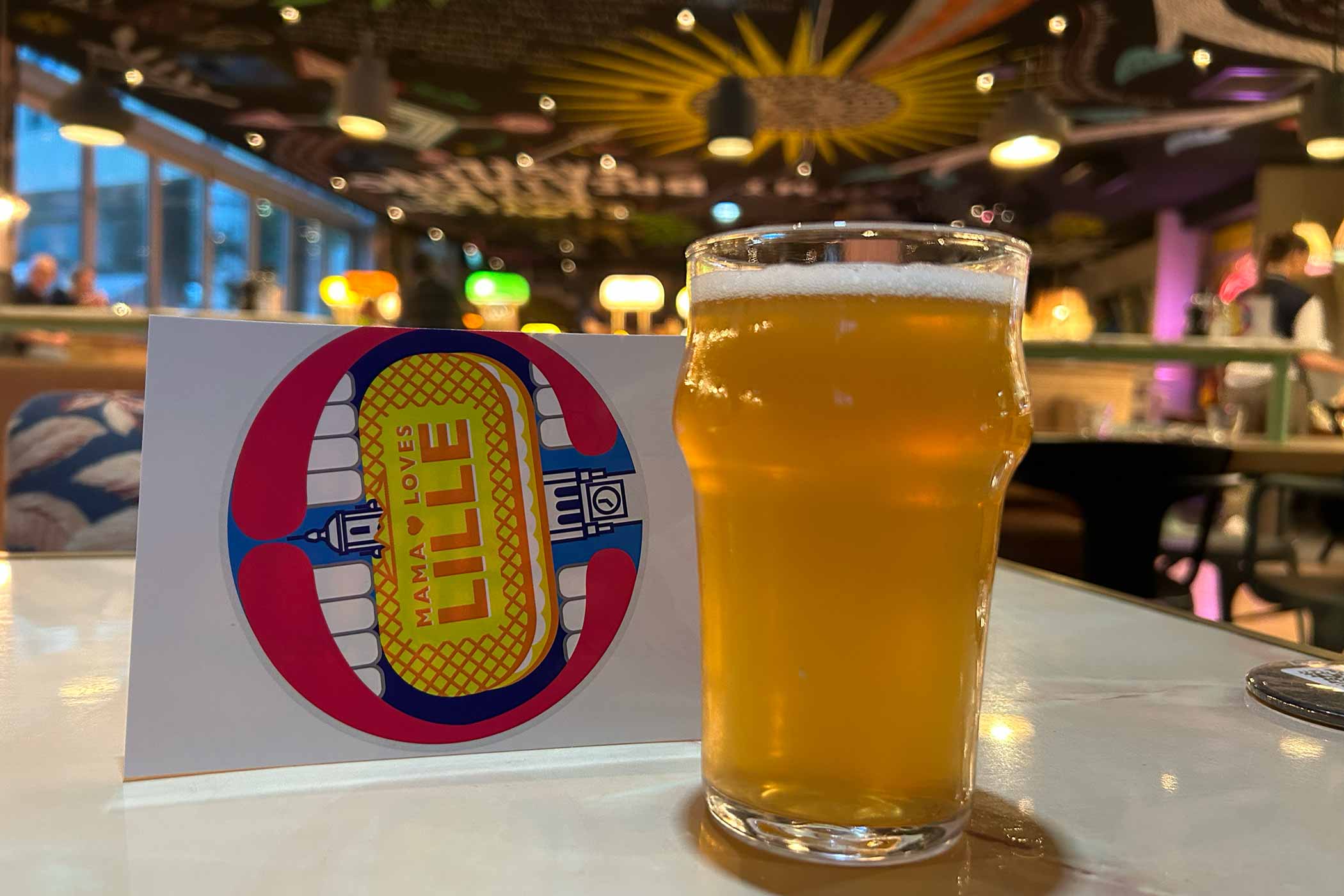Shop
Stumbling Into the Hot Pink Restaurant With the Most Pleasurable Food in France
Flipping Flemish food and beer on its head!
Looking For More?
As I scramble over the cobblestone streets of Lille looking down at the tips of my toes to avoid tripping, a flash of pastel pink catches my eye. Drawn into the Barbie-pink building, a puff of sizzling fat and fried potato greets me. Along with a smiling, goateed man, forearms tatted with a fork and knife.
I knew at once this had to be Michelin-star chef Florent Ladeyn, a second-place finalist on the inaugural season of Top Chef France, and founder of Bierbuik.
The estaminet, a tavern popular in Northern France in the nineteenth century, is unmissable. Not just for its dazzling color on the outside but for the dazzling things brewing on the inside.
Because once you step inside this garish art deco diner and meet Ladeyn, you quickly learn that Bierbuik reflects the inside of Ladeyn’s mind: bright and brilliant.
The contemporary pub even mirrors Lille itself, the “Beer Capital of France,” an hour north of Paris, experiencing its own food and craft beer renaissance.
Inside Bierbuik’s bordering-neon pink walls, you’ll find Flemish food flipped on its head. All driven by Ladeyn’s ceaseless quest to make moreish street food and brew wild ales with locally foraged ingredients.
From Fork-and-Knife Michelin-Starred Restaurants to Finger Food
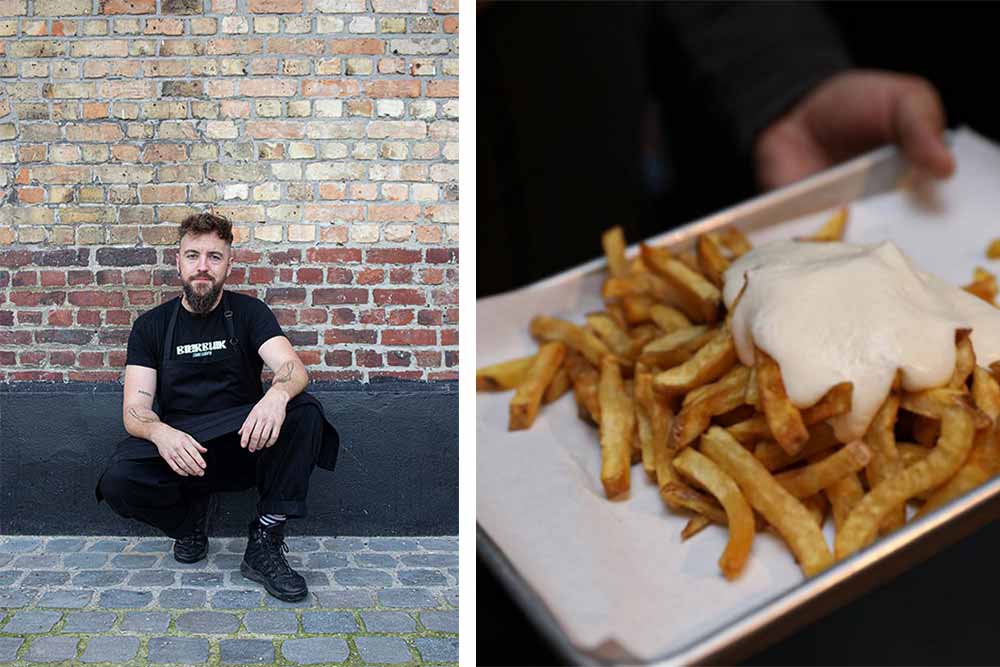
Bierbuik Founder and Chef Florent Ladeyn (on the left) and his signature dish frites with Maroilles cheese sauce (on the right) | Photography courtesy of Bierbuik
Ladeyn grew up in the restaurant industry, taking over his parent’s restaurant, Auberge du Vert Mont, in the Lille area and turning it into a Michelin-starred establishment.
He speaks reverently about growing up where he learned to speak English by talking with visitors while tending the bar
But he eventually tired of the rigidity of high-end service. “I [wanted] to be done with fine dining plating and tweezers,” he says.
Ten years ago, he opened his own place, Bloempot, 200 meters away from Bierbuik, to gradually break away. “I worked every noon service in the countryside and every dinner in Lille,” he shares. “After a few years, I [saw] that in a city like Lille, there was no way to find a good place to eat in the afternoon,” says Ladeyn.
Which is why he opened Bierbuik.
Bierbuik takes everything Ladeyn learned from fine dining—local produce, expert technique, exquisite service—but ditches the tweezers for fingers and replaces the wine list with craft beer he made on-site (until two years ago when he moved operations because he needed more space).
“The idea here is to use one hundred percent local products, one hundred percent homemade products; it’s exactly the same product we’re going to serve you in the Michelin-star restaurant,” Ladeyn says. “The difference is the number of hours.”
He added the brewery because he thought it would be fun. “It’s like cooking; it’s like making a broth. … The only difference is that you have to wait one month to taste it!” Ladeyn told me as we tucked into one of his house-made sour beers called Glycine Municip’ale, made with the wisteria plant (glycine in French) that he foraged from a cemetery on the French-Belgian border near his home. (He initially didn’t want to share the story with me because he technically harvested the flowers from the Belgian side of the border, “But I cannot lie!” he proclaimed.)
At Bierbuik, Ladeyn embraces street food. Something he says France has been slow to understand.
Instead of spending two to three hours on a multi-course meal, over a casual lunchtime, we dig into twice-fried beef-fat frites with four different sauces—a hay-smoked mayo (my favorite), a green leek oil mayo, a beet ketchup, and a cheese sauce made of Maroilles, a local raw cow milk cheese brushed and cleaned with beer.
You can’t miss it because “it smells really strong, like really strong,” laughs Ladeyn. At Bierbuik, Ladeyn layers the cheese with sour cream and warm milk to smooth it out to something less insane.
Despite the fact that Ladeyn doesn’t like cheese (“I shouldn’t say that too loud because I’m a French chef,” he jokes), the frites with Maroilles cheese sauce became his signature dish. Even while he still cooked at Auberge du Vert Mont.
But at Bierbuik, “It’s about street food,” he told me between bites. “You don’t have to think much about balance, about textures. It can be too hot, it can be too fatty, it can be too salty because it’s just about pleasure, eating with your fingers.”
And for Ladeyn, it’s more faithful to how he grew up around the table eating with family.
It’s why he proudly shows me his tattooed forearms, the left with a fork and the right a knife. “But not a chef’s knife,” he points out. No, it’s just a regular ol’ butter knife. “Because I love to go to the table,” he explains, thinking back to all the memories he spent with his grandparents and family around something with four legs.
“I love what the table means—people being together, speaking together, enjoying a meal, sharing food,” he says with sparkling eyes. “Beer [and food] bring people together. This is important and beautiful.”
That’s why most of the tables in Bierbuik are long, with single lights overhead, adding a dim glow to your space. Ladeyn says it encourages people to sit next to each other to get to know each other and share conversation over a meal in their own little space.
Bierbuik Brings Family and Friends to the Table
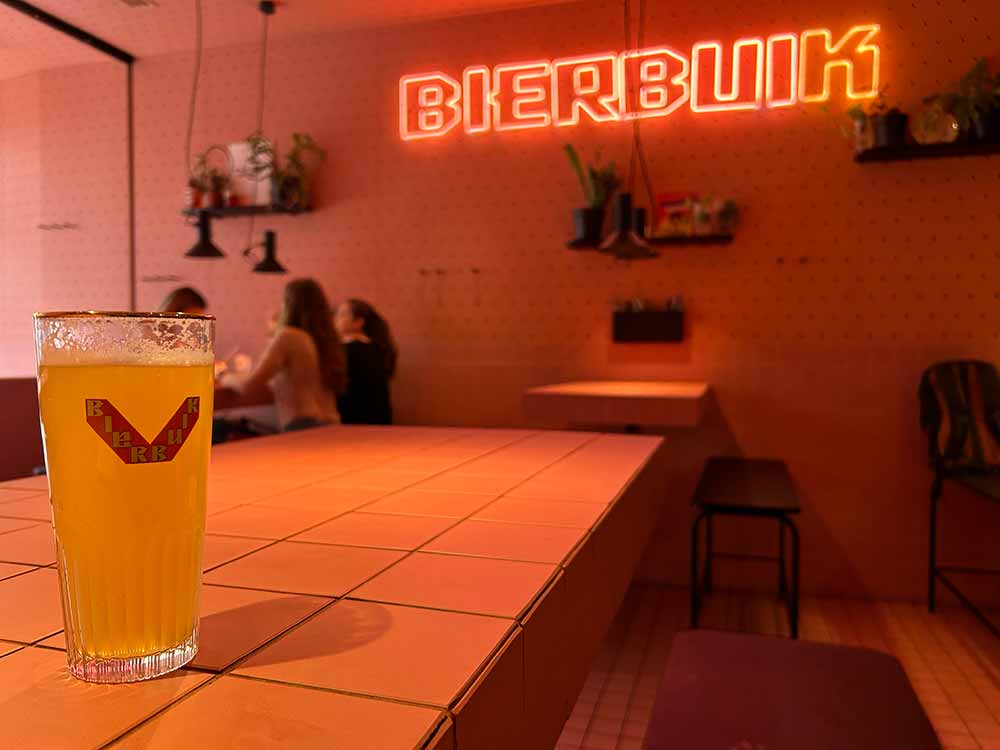
Photography courtesy of Grace Weitz | Hop Culture
Family and friends find ways to wind themselves all through Bierbuik.
Ladeyn’s cousin is a hop farmer, so the chef-cum-brewer leverages local hops for his beers. “They’re not as funky or sexy as U.S. hops, but they are from here,” Ladeyn says. “We are always adding our local homemade spices and herbs, too.”
His falafel dish includes lentils from a farmer at la ferme du Duneleet named Stephanie, who took over her parents’ farm, believing that farming should avoid using tractors because it turns the soil too much. “She puts in nothing, and she’s doing great,” Ladeyn told me. “These lentils, I make sprouts with water on top, then blend it with shallots and spices.”
The sausage for another dish isn’t homemade, but it comes from Ladeyn’s hometown butcher shop, now owned by a guy he played rugby with as a kid.
A dessert playfully called Afoingato (foin is hay in French) includes hay ice cream and chicory, not coffee—because chicory is one hundred percent local.
But Ladeyn says the most popular dish is the Flammach, a flatbread made in the restaurant’s wood-fired oven using homemade sourdough and local flour fermented for seventy-two hours. The almost personal-sized pizza comes out with this perfectly springy dough that bounces back in your mouth like memory foam.
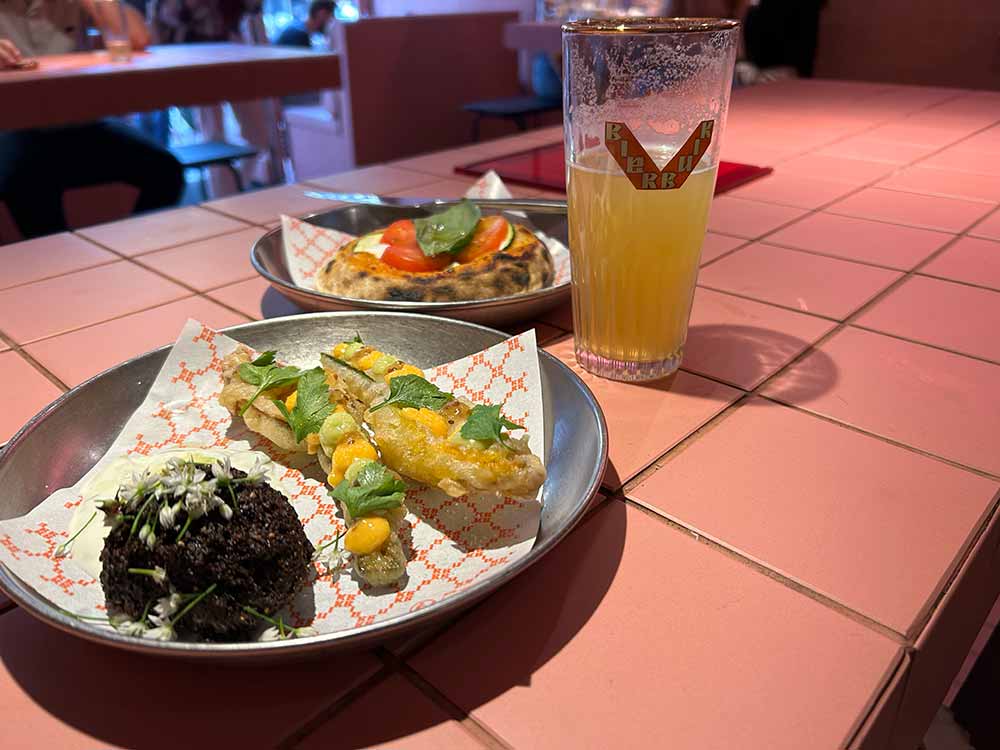
The Flammach (in the backbround) and fried zucchini flowers (in the foreground) with vinegar gel | Photography courtesy of Grace Weitz | Hop Culture
But my favorite dish?
The zucchini flower tempura. Made with a very light beer batter, the encrusted vegetable shatters under your teeth like the top of a crème brûlée when hit with a spoon. On top, dots of herb mayo coat your tongue in a buttery cream while a vinegar gel washes everything with the perfect zip.
I cleaned that plate.
Beerwise, Ladeyn rarely brews a beer twice. When I visited, besides the Glycine Municip’ale, he had a black saison with fresh hay in the tanks, an amber beer with quinoa, and an upcoming grape ale with leftover grape skins and must from a friend whose regular day job is teaching, moonlighting as a vintner when on break.
“Friday night, he’ll give me the leftovers of the grape,” says Ladeyn, who will add them into a beer during primary fermentation.
Ladeyn’s approach sticks out in a region dedicated to older Belgian styles like tripels, oud bruins, and saisons. But to him, it makes the most sense—a way to represent terroir in his beloved Lille.
Bringing Lille to the Plate and Into the Glass
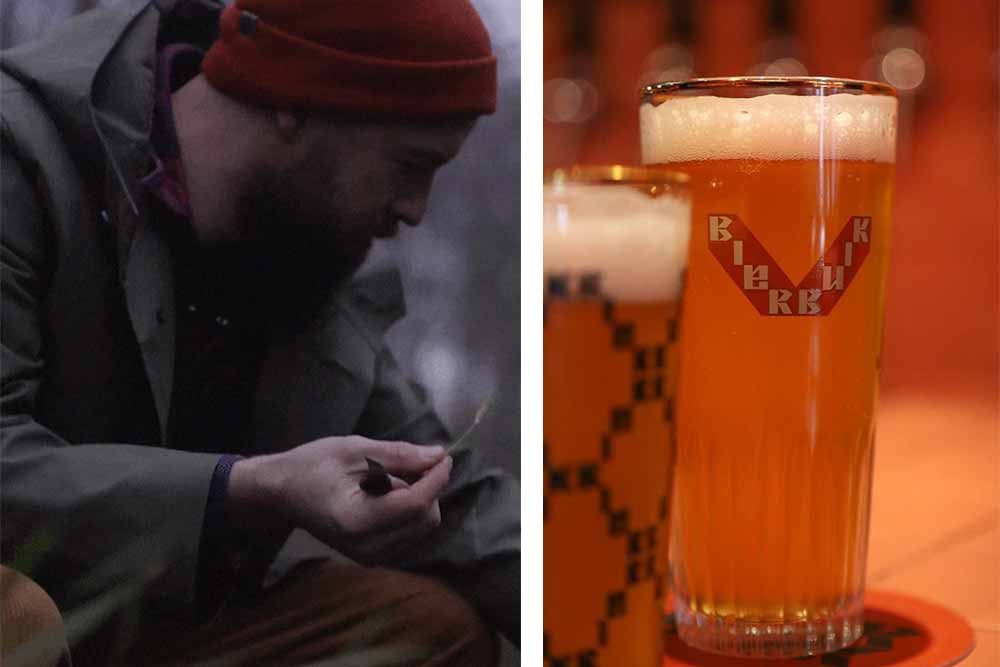
Photography courtesy of Bierbuik
Well nourished, I lean back on my stool with a content sight. But Ladeyn continues the conversation eagerly, as if he’s just started working the line during a fifteen-hour shift.
“If I say, okay, this is a white deer that my father just shot three days ago; these vegetables are done in permaculture with biodynamic farming and zero chemicals, and I made this toast with my own sweetbreads, and then I serve it to you with a beer from Denmark or Sweden, there’s no logic in this,” he says.
So yes, the local verbena he uses for a verbena Berliner Weisse might be five or six times more expensive, and the natural fruit he wants to put into a sour will cost more than a frozen puree, but “when you fight so much for a craft label, it should be crafted,” he exclaims.
Above all, Ladeyn wants people to open their palates and minds to something different.
Like wandering inside a pastel pink estaminet that catches your eye across the cobblestones. At first, you might not be sure what to think. You might keep stumbling your way down Lille’s narrow allies, content to pass Bierbuik by.
But if you did, you’d miss one of the most pleasurable establishments in France.
As I drained my glass of wisteria sour and licked the salty grease off my fingers, Ladeyn got a text.
“That’s a reminder, I promised to get foraged hops!” he says eagerly, jumping down off his stool.
Of course he did.

